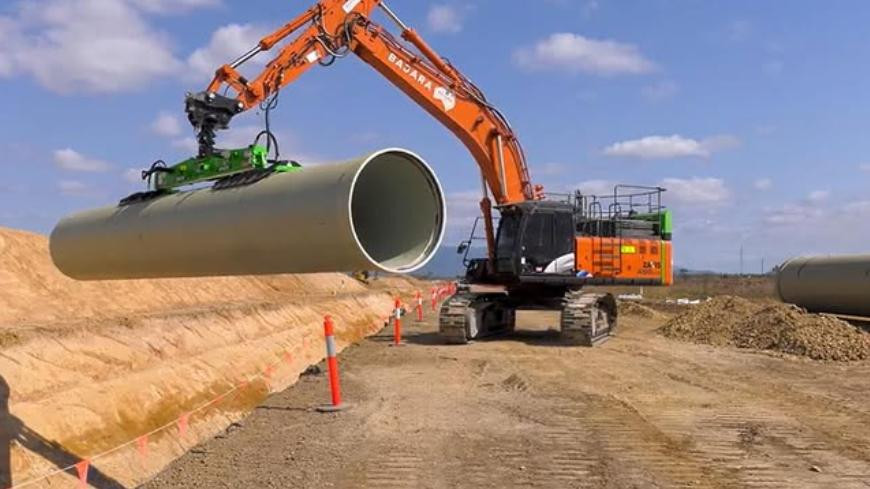Opportunities and Challenges in Australia’s Construction Industry
Fortitude Valley, Australia - March 29, 2025 / iseekplant /
Australia’s construction industry is currently navigating a challenging landscape characterized by high inflation, material shortages, rising interest rates, and widespread labor shortages. These factors contribute to economic uncertainty as project managers and construction companies strive to maintain profitability while delivering on key contracts. Despite these daunting challenges, there remains a glimmer of hope as significant government investments in infrastructure appear poised to propel the industry forward.
As the economic climate shifts, there is a clear trend towards increased digitalization within the construction sector. A report from iseekplant indicates that project managers engaged in civil, commercial, and residential projects have increased their use of digital tools by 22% over the past year. This shift highlights a growing preference for more efficient procurement processes, reflecting a departure from traditional sourcing methods. Project personnel are increasingly relying on digital platforms to find job leads for construction and access construction tenders.
In recent months, while it is encouraging to note that construction costs have somewhat stabilized, the elevated pricing continues to exert pressure on project margins. The impacts of inflation and high interest rates remain significant, affecting not only the feasibility of projects but also the speed of their execution. According to Oxford Economics Australia, the construction industry experienced a contraction of approximately 2.6% in 2023; however, experts predict a rebound with an expected annual growth rate of 3.1% between 2024 and 2027. This projection suggests a potential turnaround as market conditions improve.
Federal and state governments are stepping up efforts to revive the industry's fortunes by injecting substantial funds into infrastructure projects. Currently, there is a commitment of approximately $16.5 billion over the next decade specifically aimed at bolstering employment and supporting population growth. This investment is expected to focus on critical areas such as transport, utilities, and renewable energy initiatives, which will create new pathways for job leads in construction. Major upcoming events, including the 2032 Brisbane Olympics, are also anticipated to sustain robust demand in the sector.
While opportunities are arising from government initiatives, the construction industry continues to wrestle with several challenges. Alongside economic pressures, the sector faces an acute shortage of skilled labor. The migration of workers away from traditional construction roles and into other industries complicates recruitment efforts, leading companies to rethink their workforce strategies. The skills shortage demands immediate attention; addressing this requires concerted cooperation between industry stakeholders and education providers.
Sustainability demands are also becoming increasingly prominent across the construction sector. Businesses are tasked with not only meeting the current infrastructure needs but also adhering to environmental standards and expectations. The pressure to deliver projects that are environmentally friendly and socially responsible adds another layer of complexity to procurement processes. As stakeholders place greater emphasis on sustainable practices, companies will need to adopt new methodologies and technologies that align with these evolving standards.
Despite these ongoing hurdles, the potential for innovation is evident through the growing use of digital construction tools like iseekplant https://www.iseekplant.com.au. By embracing technology, companies can improve efficiency and communication, thereby reducing project delays and increasing project margin. The rise of digital platforms is projected to facilitate access to crucial job leads for SMES in construction, streamlining the way in which project professionals engage with suppliers for tenders and potential opportunities.
In light of these trends, the construction industry stands at a crossroads. With government investments paving the way for new infrastructure projects and the ongoing digital transformation reshaping traditional practices, there lies a unique chance for industry players to adapt and thrive amidst adversity. The future of construction in Australia will likely hinge on how well these stakeholders can harness these opportunities to streamline their businesses and project delivery processes, as a way of tackling the underlying challenges that persist.
As the construction sector moves forward, it is essential for companies to stay informed and agile. Adopting innovative technologies and strategies will be key in identifying and securing job leads for construction. By enhancing their approach to sourcing construction tenders and exploring new avenues for project delivery, industry participants can better position themselves for success in an unpredictable economic climate.
Engagement with digital platforms and tools does not just represent a trend; rather, it signifies a fundamental shift in the industry's operational landscape. Construction has long been a laggard in digitisation, but a recent uptick in adoption of SaaS, marketplaces and other cloud based efficiency tools is encouraging the stripping out of cost, time and resources from projects and businesses. By staying ahead of these changes, construction companies can maximize their growth potential, improve their competitive advantage, and ultimately contribute to a more resilient and sustainable industry.
In conclusion, while Australia’s construction industry faces considerable challenges, the confluence of government investment, digital tool adoption, and an evolving market presents a range of potential opportunities. Stakeholders must navigate this complex environment carefully, leveraging the available resources and technologies to enhance productivity and secure the future of the sector. The ongoing evolution of the industry is a testament to its resilience and adaptability, underscoring the importance of proactive engagement with both current trends and emerging demands.
For small contractors to Australia's construction industry, companies can view the types of projects and opportunities being posted on iseekplant by civil, commercial and residential project managers at iseekplant's Job Board: https://jobboard.iseekplant.com.au/

Contact Information:
iseekplant
Level 6, 51 Alfred Street
Fortitude Valley, Queensland 4170
Australia
Sally McPherson
+61 1300 691 912
https://jobboard.iseekplant.com.au


